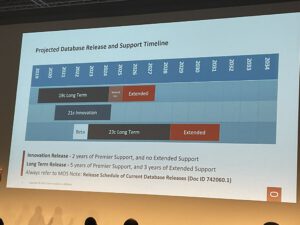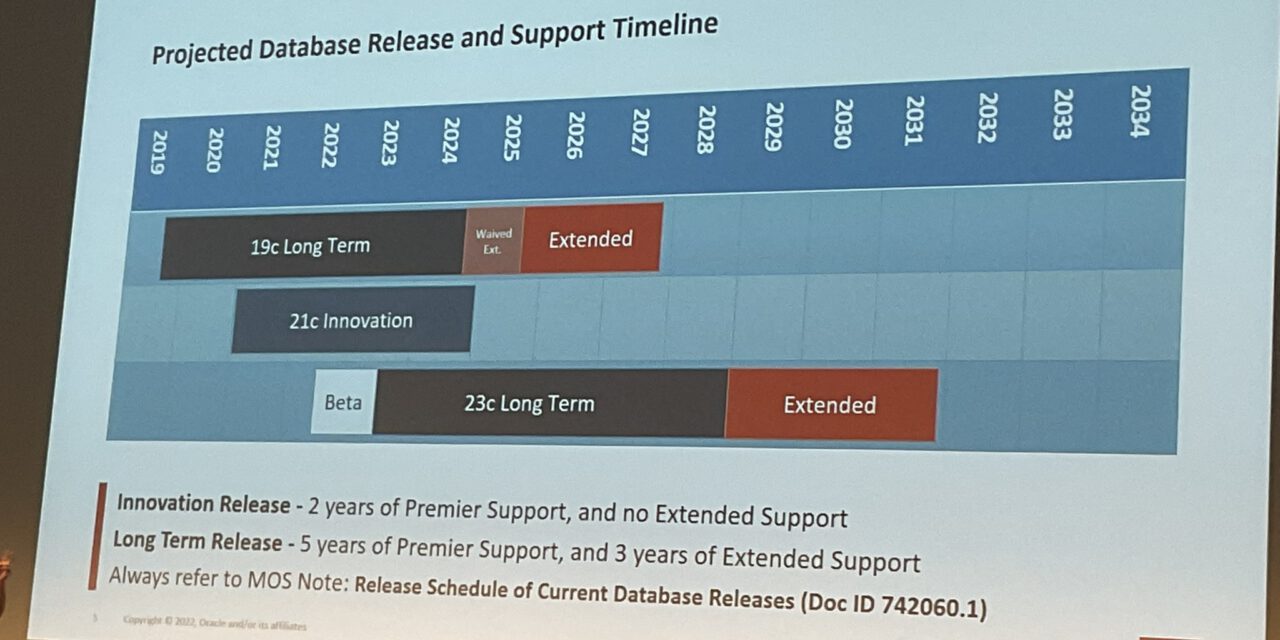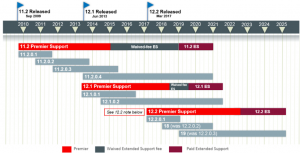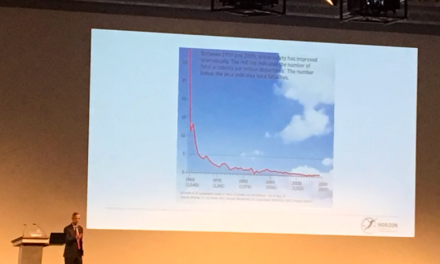Update Oct/2022
Monthly recommended patches will replace Release Update Revisions (RURs) from Nov/2022 onwards. Release Updates (RUs) will remain the same (see article below)
MRP include recommended patches and all prior MRPs for the Release Update.
Update Jan/2021 see at the end of the article.
Oracle’s new release model includes
- Yearly new releases (and numbered according to the year) instead of a multi-year cycle. Most annual releases will be supported for three years and outlined in the Lifetime support policy document (see at the end of this post)
- Quarterly Release Updates (RUs are already introduced and part of 12.2)
- Quarterly Release Updates Revisions (RURs are already introduced and part of 12.2)
The new release model applies to the Oracle database, Grid Infrastructure, and OJVM. But: Windows patching won’t change and will continue to use Bundle Patches.
The format for the release model is <year>.<update>.<revision>
- <year> is the delivery year for the release and will start with 18c (the first release with the new model is expected in late 2017 or early 2018 and supersedes the original name 12.2.0.2. 19c is supposed to supersede the original name 12.2.0.3)
- <update> stands for the RU level
- <revision> stands for the associated RUR level
Example:
|
Version
|
Release
|
RU
|
RUR
|
|
|
18.1.0
|
18
|
1
|
0
|
|
|
18.2.0
|
18
|
2
|
0
|
First Release Update
|
|
18.2.1
|
18
|
2
|
1
|
First Release Update Revision for RUs from the last six months
|
The following table shows differences between Release Updates (RU) and Release Update Revisions (RUR)
|
|
RU
|
RUR
|
|
Shipping date
|
January, April, July, October
|
January, April, July, October
extend the RU’s lifetime up to two quarters
|
|
Replaces
|
Bundle patch
|
Patch set updates (PSU)
|
|
Switching
|
Switch to RUR possible
(for switching scenarios see the example below)
|
Switch to RU possible
(for switching scenarios see the example below)
|
|
Security fixes
|
Yes
|
Yes
|
|
Regression fixes
|
Yes
|
Yes
|
|
Proactive functional fixes
|
Yes
|
No
|
|
Minor functional enhancements
|
Yes
|
No
|
|
Emergency one-off patches
|
Yes
|
No
|
|
Optimizer fixes that can change plans
|
Yes
(see Doc ID 2147007.1)
|
No
|
|
Deployment
|
specific to a particular annual release.
RUs are full patches
|
specific to a particular RU.
RURs are supersets of all RUs where the second field is smaller than or equal to the RURs second field. You are not required to first apply a prior RU.
|
Oracle’s Release Updates (RU) and Release Update Revisions (RUR) timeline:
|
|
Jan 18
|
Apr 18
|
Jul 18
|
Oct 18
|
Jan 19
|
Apr 19
|
Jul 19
|
Oct 19
|
|
RU
|
18.1.0
|
18.2.0
|
18.3.0
|
18.4.0
|
18.5.0
|
18.6.0
|
18.7.0
|
18.8.0
|
|
RUR #1
|
|
|
18.2.1
|
18.3.1
|
18.4.1
|
18.5.1
|
18.6.1
|
18.7.1
|
|
RUR #2
|
|
|
|
18.2.2
|
18.3.2
|
18.4.2
|
18.5.2
|
18.6.2
|
|
RU
|
|
|
|
|
19.1.0
|
19.2.0
|
19.3.0
|
19.4.0
|
|
RUR #1
|
|
|
|
|
|
|
19.2.1
|
19.3.1
|
|
RUR #2
|
|
|
|
|
|
|
|
19.2.2
|
18.1.0 and 19.1.0 are planned without RURs.
Switching between RUs and RURs is possible as long as versions are cumulative of one another. Cumulativeness can be computed by adding the second and third number of the version for source and destination DB. The sum for the destination DB must be greater or equal to the sum of the source DB. Examples according to Oracle Doc ID 2285040.1
|
Source
|
Destination
|
Conclusion
|
|
18.2.2
sum of second and third fields is 2+2=4
|
18.5.0
sum of second and third fields is 5+0=5
|
Destination 5 is greater than or equal to source 4 so it is OK to move
|
|
18.2.2
sum of second and third fields is 2+2=4
|
18.3.0
sum of second and third fields is 3+0=3
|
Destination 3 is less than source 4 so a patch application error will be issued
|
|
18.5.0
sum of second and third fields is 5+0=5
|
18.4.1
sum of second and third fields is 4+1=5
|
Destination 5 is equal to source 5 so it is ok to move. Caution: you will go backward one quarter from a “high-priority non-security fixes” point of view. But you are still keeping the regression and security fixes
|
One-off emergency patches are still available with the new release model. The OOW 2017 presentation also mentions monthly “Release Update (RU) Incremental Drops” to accelerate stabilization during the early part of a release lifetime. All incremental drop content is expected to be included in the next quarterly RU.
The current release roadmap according to Doc ID 742060.1:
Further information:
- Release Update Introduction and FAQ (Doc ID 2285040.1)
- Release Schedule of Current Database Releases (Doc ID 742060.1)
- Oracle Database – Overview of Database Patch Delivery Methods (Doc ID 1962125.1)
- Automatic Fix Control Persistence (FCP) for Database Proactive Bundle Patch (Doc ID 2147007.1)
- Oracle Lifetime Support policy
- Database Security Patching from 12.1.0.1 onwards (Doc ID 1581950.1)
Update 28-MAR-2020 and 15-JAN-2021:
There are two types of Oracle Database releases: Long Term Release (highest level of stability with typically 5 years of Premier support) and Innovation Release (new features that may also be included into the next long term release).
The blog post “To which release should you upgrade to? Revisited …” by Mike Dietrich contains the most recent information about the roadmap. The above mentioned Doc ID 742060.1 is still the most important document for release information.
|
Release
|
GA Date
|
End of premier support
|
|
12.2.0.1 (Innovation Release aka Initial Release)
|
Mar 2017
|
Nov 2020 without extended support
|
|
18c (Innovation Release aka First Patch Set)
|
Jul 2018
|
Jun 2021 without extended support
|
|
19c (Long term support Release aka Terminal Patch Set)
|
Apr 2019
|
Apr 2024 with extended support until Mar 2026
|
|
20c
|
skipped
|
|
|
21c (Innovation Release
|
January 2020
|
Jun 2023 |
Update Oct/2022




